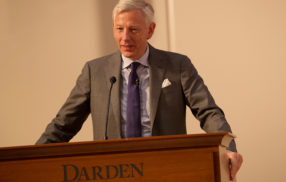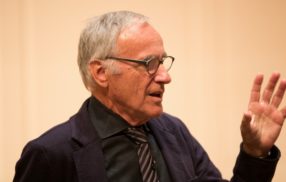How Culture and Location Help One Tech Company Thrive Far From Silicon Valley
By Dave Hendrick
Engaged in a fierce talent war for the finite pool of United States-based software developers, WillowTree Inc. CEO Tobias Dengel said the company sells itself to prospective employees with its unique culture and, increasingly, its location.
The latter selling point was of particular interest to technologically oriented University of Virginia Darden School of Business students, as the company’s headquarters and bulk of its roughly 200 employees are located in downtown Charlottesville, Virginia, roughly a mile from Grounds.
Rather than being a hindrance, the location has served the mobile app developer and digital services agency well as it has embarked on a period of rapid growth, with its headcount increasing from three employees in 2010 to roughly 200 in early 2017 — with plans to continue expanding at a similar pace.
Dengel, speaking to the Darden community at a Leadership Speaker Series event, likened the business climate in Charlottesville, a city anchored by a University ecosystem and known for a high quality of life, to similar fast-growing economies like Boulder, Colorado; Madison, Wisconsin and Pittsburgh, Pennsylvania. They are the sorts of often-overlooked places that are “changing the world” and will be “fundamental in how the economy moves forward,” Dengel said.
But to compete and grow as a business, Dengel said you need more than just a compelling backdrop. You need a service that others are willing to pay for, and WillowTree has a demonstrated track record for providing in-demand services and products.
The company’s current incarnation began in 2009, when WillowTree founder Michael Prichard pitched Dengel, a successful entrepreneur who had co-founded and sold Leads.com and moved to Charlottesville for his wife’s residency at the UVA Medical Center, on a mobile ticketing platform for the Apple iPhone. That particular project was of minimal interest to Dengel, but the quality of the app at a time when interest in the emerging mobile platform was skyrocketing led Dengel and Prichard to rethink their market opportunity and instead position the company as a one-stop digital services company with a specialization in the construction of high-quality apps.
“We’ve been able to grow that into one of the premier mobile product — or digital product — agencies by being able to be in a place like Charlottesville and the advantage that it offers us,” Dengel said.
The CEO said the company, which has designed apps and digital content for top tier brands such as Time Warner, Pepsico, American Express and Nestle, among scores of others, operates in the nexus where design, software development and strategy intersect.
“Those have historically been three classes of disciplines … but doing all three is a really new thing,” Dengel said.
Although the company has been able to operate in a “white space” with minimal direct competition, Dengel said he can feel that rapidly shifting, as well-heeled players rush to offer an integrated digital solution.
The CEO joked that the company feels like the “arms merchant” in a business world where executives have an overriding focus on how to use software and technology to stay ahead of the competition. WillowTree, too, is trying to stay ahead of the competition, as Dengel said the company sees huge opportunities in the artificial intelligence and machine-learning spaces.
As a young and relatively small company, Dengel said WillowTree currently works with and competes favorably against significantly larger outfits in part by adhering to a few core principles. The company believes in “small teams of A players,” all co-located and all overseen by a “directly responsible individual.”
Dengel said the company recently worked on a project for a large multinational corporation where WillowTree and the client’s in-house developers, who were scattered across the world, shared a roughly equivalent workload.
“They had 22 folks on the project,” Dengel said. “We had five people in Charlottesville, and we ran laps around them because our teams are smaller and better.”
Dengel said the company believes strongly in the in-office environment and is “fundamentally against work from home.”
“We believe that any creative enterprise is fundamentally social,” Dengel added.
The company has so far kept a happy and growing workforce — WillowTree routinely shows up on various best places to work lists — by trying to grow the company while holding true to a handful of core values, including craftsmanship, ownership, optimism and open communications, among others.
“Culture is everything,” Dengel said. “It’s ultimately the answer to both whom we hire and how we get everyone to work so well together.”
The University of Virginia Darden School of Business prepares responsible global leaders through unparalleled transformational learning experiences. Darden’s graduate degree programs (MBA, MSBA and Ph.D.) and Executive Education & Lifelong Learning programs offered by the Darden School Foundation set the stage for a lifetime of career advancement and impact. Darden’s top-ranked faculty, renowned for teaching excellence, inspires and shapes modern business leadership worldwide through research, thought leadership and business publishing. Darden has Grounds in Charlottesville, Virginia, and the Washington, D.C., area and a global community that includes 18,000 alumni in 90 countries. Darden was established in 1955 at the University of Virginia, a top public university founded by Thomas Jefferson in 1819 in Charlottesville, Virginia.
Press Contact
Molly Mitchell
Senior Associate Director, Editorial and Media Relations
Darden School of Business
University of Virginia
MitchellM@darden.virginia.edu






